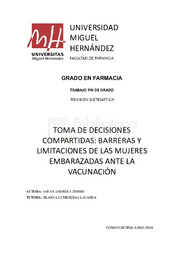Por favor, use este identificador para citar o enlazar este ítem:
https://hdl.handle.net/11000/33094Toma de decisiones compartidas: barreras y limitaciones de las mujeres embarazadas ante la vacunación
| Título : Toma de decisiones compartidas: barreras y limitaciones de las mujeres embarazadas ante la vacunación |
| Autor : Zimbru, Sarah Andreea |
| Tutor: Lumbreras, Blanca |
| Editor : Universidad Miguel Hernández |
| Departamento: Departamentos de la UMH::Salud Pública, Historia de la Ciencia y Ginecología |
| Fecha de publicación: 2024-05-16 |
| URI : https://hdl.handle.net/11000/33094 |
| Resumen : INTRODUCCIÓN: las tasas de vacunación en el grupo de las embarazadas siguen siendo subóptimas. Uno de los principales motivos propuestos es la vacilación ante la vacunación, aspecto que ha podido tener un mayor impacto después de la pandemia COVID-19. El grupo SAGE (Strategic Advisory Group of Experts on Immunization) de la OMS considera la comunicación en el entorno clínico entre médico y paciente como una herramienta que contribuye positivamente en la aceptación de las vacunas. La toma de decisiones compartida proveyendo información acerca de los beneficios y riesgos de la vacunación constituiría una de las intervenciones más eficaces. OBJETIVOS: el objetivo principal del presente trabajo es recabar la evidencia disponible acerca de las barreras y limitaciones que surgen en la toma de decisiones compartidas en la vacunación de mujeres embarazadas después de la pandemia COVID-19. MÉTODOS: Se llevó a cabo una búsqueda bibliográfica en tres bases de datos del ámbito de ciencias de la salud (MEDLINE a través de PubMed, Scopus y Embase) sobre artículos originales sobre las barreras y limitaciones de la toma de decisiones compartida ante la vacunación en embarazadas. La revisión y la extracción de las variables de los artículos se llevó a cabo por dos evaluadoras independientes siguiendo las recomendaciones PRISMA. La calidad de los artículos se evaluó a través de las guías STROBE, GUIDED y SRQR, de acuerdo al diseño del estudio. RESULTADOS: se obtuvieron un total de 1021 artículos, seleccionando finalmente 15 para la revisión: 2 eran estudios cuantitativos transversales, 11 estudios cualitativos y 2 de métodos mixtos. Las barreras encontradas para profesionales sanitarios incluyeron la falta de tiempo, el fuerte deseo de respetar la autonomía de las embarazadas en relación a la vacunación y la falta de conocimiento acerca de los beneficios y riesgos de las vacunas. Para las mujeres embarazadas, las barreras halladas fueron: la falta de conocimiento, la percepción a la susceptibilidad frente a las enfermedades, el miedo a los efectos secundarios, barreras organizativas en la accesibilidad a la vacunación y creencias. CONCLUSIONES: la presente revisión recopila las principales barreras presentes en la toma de decisiones frente a la vacunación en embarazadas, por parte de los profesionales sanitarios y las mujeres embarazadas. Se mencionan varias barreras modificables, cuyo abordaje podría contribuir a la implementación de la toma de decisiones compartidas también en el ámbito de la vacunación materna. Asimismo, se describen por primera vez nuevas barreras surgidas a partir de la pandemia del COVID-19. INTRODUCTION: vaccination uptake in pregnant women is still suboptimal. One of the proposed reasons is the vaccination hesitancy. The SAGE group belonging to the OMS considers communication in clinical settings between doctor and patient to be a tool that contributes positively to the acceptance of vaccination. Shared-decision making, providing information about the benefits and risks of vaccinations would constitute one of the most effective interventions. OBJECTIVES: the main objective of this work is to review the available evidence about the barriers and limitations for shared decision-making in maternal vaccination after the COVID-19 pandemic. METHODS:a bibliographic search was conducted in three health science databases (MEDLINE via PubMed, Scopus, and Embase) on original articles about the barriers and limitations of shared decision-making regarding vaccination in pregnant women. The review and extraction of variables from the articles were conducted by two independent evaluators following PRISMA recommendations. The quality of the articles was assessed using STROBE, GUIDED, and SRQR guidelines, according to the study design RESULTS: A total of 1021 articles were obtained, finally selecting 15 for review: 2 were cross-sectional quantitative studies, 11 were qualitative studies, and 2 were mixed-methods studies. The barriers found for healthcare professionals included lack of time, a strong desire to respect pregnant women's autonomy regarding vaccination, and lack of knowledge about the benefits and risks of vaccines. For pregnant women, the barriers found were lack of knowledge, perception of susceptibility to diseases, fear of side effects, organizational barriers in accessing vaccination, and beliefs. CONCLUSIONS: This review gathers the main barriers present in decision-making regarding vaccination in pregnant women, from the perspective of healthcare professionals and pregnant women themselves. Several modifiable barriers are mentioned, the addressing of which could contribute to the implementation of shared decision-making in the field of maternal vaccination. Additionally, new barriers arising from the COVID-19 pandemic are described for the first time. |
| Palabras clave/Materias: barreras toma de decisiones compartidas vacunación embarazo cuidado prenatal barriers shared decision-making vaccination pregnancy prenatal care |
| Área de conocimiento : CDU: Ciencias aplicadas: Medicina: Farmacología. Terapéutica. Toxicología. Radiología |
| Tipo de documento : info:eu-repo/semantics/bachelorThesis |
| Derechos de acceso: info:eu-repo/semantics/openAccess |
| Aparece en las colecciones: TFG - Farmacia |
 La licencia se describe como: Atribución-NonComercial-NoDerivada 4.0 Internacional.
La licencia se describe como: Atribución-NonComercial-NoDerivada 4.0 Internacional.
.png)
